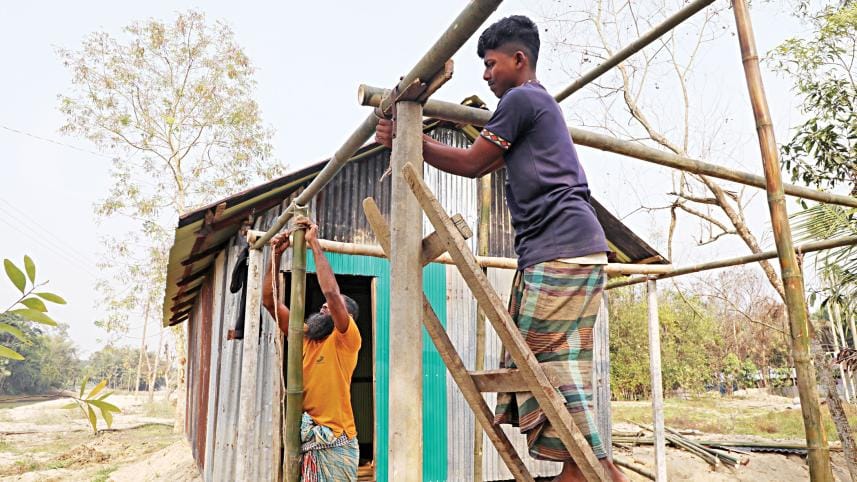Noakhali-Feni: Floodwaters gone months ago but sufferings linger

Nineteen-year-old Sajjad Hossain had no alternative but to start building a new thatched home for his two sisters, mother and himself since their house was swept away by a flood four months ago in Pashchim Aloka village, situated on the banks of Muhuri river in Feni's Parshuram upazila.
Initially, they opted to live in his grandmother's house in Gutuma village, around 12km away from their own, after the devastating flood hit in August.
"Within a few hours of rain, the embankment on the river broke down and the water entered our home. At first, we took shelter in a neighbour's under-construction house. After staying there for a few days, we moved to our grandmother's house."
At that time, some government officials visited the Pashchim Aloka village, while some non-government organisations listed the flood-hit victims, including Sajjad and his family.
"We initially received some food assistance and were given Tk 12,000 collected by eight separate sources… But nothing since then."
After a four-month wait for proper assistance and relief, Sajjad took it upon himself to build a house on the yard of their previously destroyed house. He took help from his neighbour Md Liton Mia -- another victim.
Visiting the yard earlier last month, this correspondent saw Sajjad, a diploma student of electrical engineering, working on the thatched house with Liton.
"We couldn't recover anything from our old house except for some corrugated tin sheets from the rooftop. We've started afresh and bought everything for this new house," he told The Daily Star.
He added that his mother had to borrow money from relatives so that he could build the new house.
Md Liton, who has been helping Sajjad, had his own home swept away. Along with that, the paddy he cultivated on an acre of land was destroyed.
"I have been spending my nights sleeping under a makeshift shed.
"After some initial food assistance, there has been no help. I'm now trying to survive as a day labourer and by helping people build new homes for themselves."
Liton further said 12 homes of the village were completely destroyed but only three families got financial assistance from different companies and organisations to rebuild their homes. He, however, was not lucky enough.
The situation is no different in the neighbouring district of Noakhali.
Tajul Islam, a timber trader of Babunagar village in Begumganj upazila, said his house had been waterlogged for over a month since the floods.
"My house was not washed away completely but it has been severely damaged. The corrugated tin sheets have to be changed, and the wood and bamboo were also destroyed.
"My business is also not going too well as people don't have money in their hands in the face of such a situation. And so, I don't have money to fix my own house either."
GOVT SUPPORT 'NOT ENOUGH'
The late August floods caused damage worth an estimated Tk 14,421.46 crore, and the government would need to increase its budget for relief distribution, according to a study of the Centre for Policy Dialogue released on October 6 last year.
Noakhali endured 29.07 percent of the damages, followed by Cumilla at 23.51 percent; Feni at 18.61 percent; and Chattogram at 11.63 percent.
According to data from the DC offices, over 90 percent of the populations in Feni and Noakhali – the hardest-hit districts in the August floods – have been severely affected.
In Noakhali, the floods, triggered by heavy rains and water surges from the upstream, have caused damages worth Tk 4,185.51 crore, according to the district administration.
District Relief and Rehabilitation Officer Zahid Hasan Khan confirmed that 1,28,300 houses were damaged, amounting to Tk 309.60 crore in losses.
About the government's assistance for flood victims, Noakhali Deputy Commissioner Khandkar Estiaque Ahmed and Feni Deputy Commissioner Saiful Islam both said the government has taken initiatives to build 90 houses in Noakhali and 110 in Feni.
At least 8,453 houses – 50 concrete, 350 semi pucca and 8,053 thatched -- have been completely damaged, while 1,46,439 were partially damaged.
Noakhali DC Estiaque said, "Though the government is initially providing 90 houses, the support is not enough for the victims," adding that the government is supposed to allocate more houses later.
The district administration has provided aid to nearly 21 lakh flood-affected people in 87 unions and eight municipalities across nine upazilas of the district. The relief measures include Tk 58.98 lakh in cash, 1,800 metric tonnes of rice, 1,000 packets of dry food, Tk 15 lakh for baby food, and Tk 15 lakh for animal feed.
Meanwhile for Feni, the government has prepared a list of 8,659 families who have lost their homes. According to the list, 1,798 houses have been completely damaged, while 6,941 were partially damaged.
Of the 110 houses to be built by the government for the victims, 35 will be in Feni Sadar upazila, 20 in Fulgazi, 20 in Chhagalnaiya, 20 in Parshuram, 10 in Daganbhuiyan.
The army was given the task to build these houses, Feni DC Saiful said.
Meanwhile, the government has also allocated 400 bundles of corrugated tin sheets and Tk 12 lakh in six upazilas.
In Fulgazi upazila, the Bangladesh Army has provided four bundles of corrugated tin sheets to 157 families and repaired 15 houses, while the Bangladesh Navy repaired 85 houses.
In both districts, different international development partners, including UNDP, WFP, Bangladesh Red Crescent Society, BRAC, As-Sunnah Foundation, Mastul Foundation YPSA, RIC, Gulf Co-Operative Society have provided cash assistance to some selected flood victims to help them repair their damaged homes.
However, the number of recipients is far less than the number of victims.
DEPENDING ON DEBT
In Noakhali's Subarnachar upazila, all the crops grown by Jamal Uddin in Char Amanullah village were damaged in the floods.
"I had to take a loan from an NGO to do so. Now, they come to my house every day for the repayment in instalments, but I am unable to pay it.
"I work as a day labourer and there has barely been any work for me since the floods. I worked only four days this month [last month] and was able to make only Tk 2,400.
"How am I supposed to pay back this month's instalment of Tk 8,000?"
Md Mainuddin, of Char Darbeshpur village, never had to purchase rice as he would grow his own. "But the flood damaged all my crops, my fish farm and my house.
"I had to take a loan of Tk 10 lakh from the bank to start my business afresh. Now I have to pay Tk 48,000 per month for two years. But I don't have any income to be able to do so."
Speaking to The Daily Star, Noakhali's Fisheries Officer Md Iqbal Hossain said at least 85,000 fish farms were flushed out during the flood, resulting in a loss of Tk 600 crore.
"But none of the farmers received a single penny from government as support."
Md Saiful Islam, executive director of NGO Sagarika Samaj Unnayan Sangstha, said the number of people taking loans from them has shot up since the flood.
In June and July 2024, the NGO distributed Tk 111.53 crore among 11,538 borrowers before the flood.
However, during the flood in August and September, 7,725 people took loans worth Tk 62.79.
In October and November, after the flood, loan distribution rose sharply and 17,261 people took loans worth Tk 128.24 crore.
Saiful said a total of 30 NGOs have been working to assist in flood-affected areas. "I believe the amount of loans given has increased in all NGOs as the victims need them to start working again."
Mohammad Kamruzzaman, branch manager of TMSS (Tangail-based NGO Thengamara Mohila Sabuj Sangha) in Noakhali, told The Daily Star that the organisation has disbursed over Tk 100 crore in microloans. TMSS currently operates 17 branches in the district.
"Borrowers primarily take microloans to rebuild homes damaged by the floods or to invest in agricultural activities," he said, adding that the demand for loans has been overwhelming since the flood.
"We carefully evaluate each applicant to ensure they have the capacity to repay the installments before approving the loans.".
FARMERS' WOES
In Subarnachar upazila's Char Amanullah, 50-year-old Jamal Uddin pulled out some paddy from his crop field to show this correspondent.
"See? There's no grain in these paddies. We had to cultivate the Aman rice in late September after the floodwater receded.
"We had to spend double the money as we had to cultivate twice. Yet, we could not harvest any grains as yet."
Jamal is now struggling to repay the loans he took from an NGO to bear the expenses of his Aman cultivation.
Haridas Kahar, 65, said, "Last year, I managed to harvest 200 maunds of rice. This year, all the crops were ruined by floods."
With no options left, he began working as a labourer at a local brick kiln.
Like them, at least 3.93 lakh farmers – 2.25 lakh in Noakhali and 1.68 lakh in Feni – lost all their crops and fish, said officials of the agriculture department, adding that crops on 82,000 hectares of land – 50,418 hectares in Noakhali and 32,486 in Feni -- have been damaged.
Visiting at least five upazilas in these two districts, The Daily Star saw farmers struggling to keep up with the cost of cultivation in the face of no support from the government.
On the other hand, many farmlands remain barren as farmers could not cultivate anything this season.
Md Rubel Hossain, from Aloka village in Parshuram upazila, said he cultivated Aman on 120 decimals of land. "But all the rice was washed away during the flood. There was also sand deposited on most of the croplands in my village and other surrounding villages, making it difficult for us to replant."
He said some farmers were provided with Boro seeds and Tk 1,000 cash from the government. "But only some farmers got those. Like many others, I did not get anything."
The agriculture department said around 250 hectares of land in Feni's Fulgazi and Parshuram upazilas were covered in sand that come in with the floodwater from the upstream during the flood.
In some places, there is five to 10 feet of sand covering the crop field.
In Noakhali, even larger swaths of potent land remain barren due to saline water coming in after the breach of river embankments.
At least 46,265 hectares in Subarnachar and Hatia upazilas have been rendered infertile due to salinity and waterlogging.
At least 225,000 farmers in Noakhali and 168,000 in Feni have been affected due to this.
Asked about compensation to farmers, Dr Mira Rani Das, deputy director of Noakhali's Department of Agricultural Extension, said Tk 3.9 crore from the government was distributed among 2.7 lakh farmers.
The government also distributed vegetable and paddy seeds to those farmers, Noakhali DC Estiaque said.





 For all latest news, follow The Daily Star's Google News channel.
For all latest news, follow The Daily Star's Google News channel.
Comments